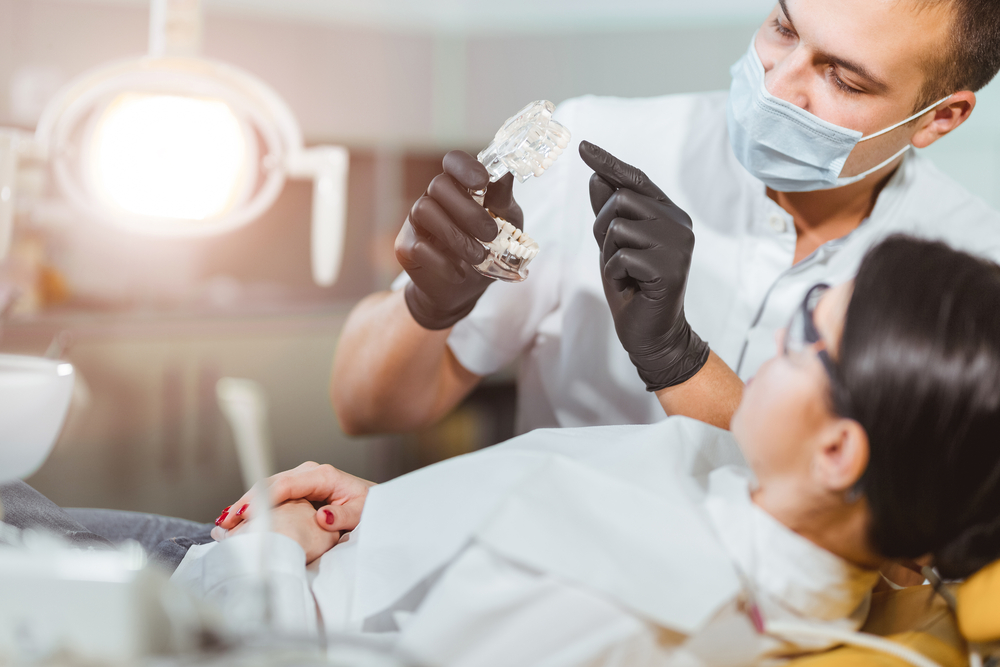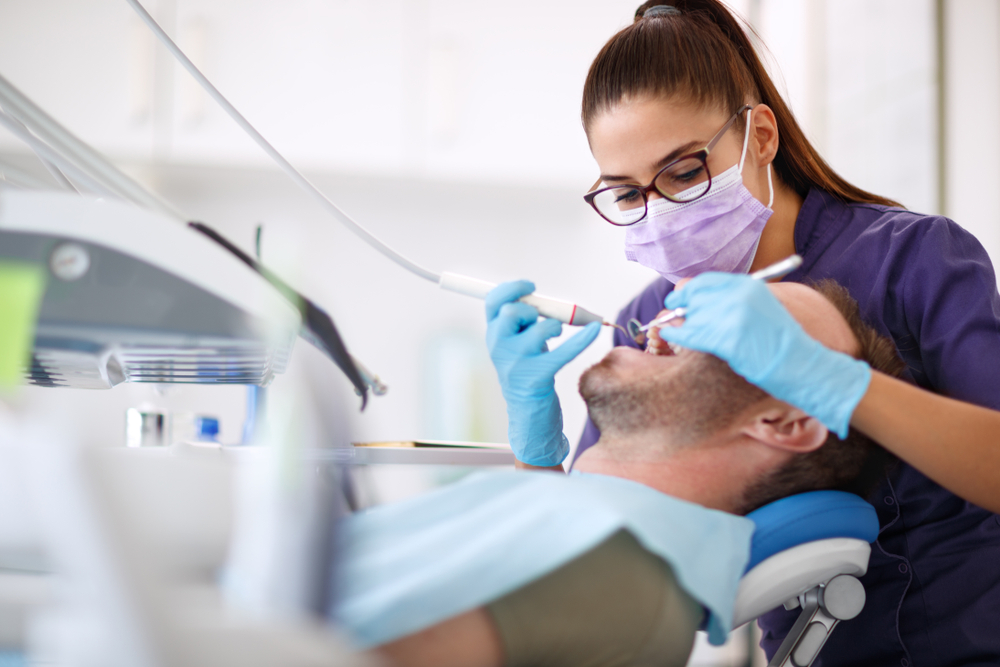Periodontal Therapy
Request an Appointment
Periodontal Therapy in Hamilton, NJ
Contrary to popular belief, tooth loss is not an inevitable part of reaching old age. Periodontal disease is preventable with good oral hygiene practices and routine dental visits. If and when it does occur, various treatments ranging from nonsurgical treatments to surgical procedures can effectively treat gum disease. By practicing proper hygiene and oral care — including routine cleanings and periodontal therapy as needed — you can keep all of your teeth for life.
At Hamilton Dental Associates, our pediatric and adult dentistry professionals want all patients to enjoy the joy and confidence that comes with having a healthy smile and healthy gums. With our team on your side, worries about painful gums and premature tooth loss will become a thing of the past. Whether you need general deep cleaning for teeth in Hamilton or a specific gum disease treatment, we are here to help. Continue reading to learn more about the different types of periodontal therapy in Hamilton, NJ, that we provide, or contact our friendly dental experts today to schedule a treatment appointment!

We Are Here to Help You
Learn More
Periodontal Disease: An Overview
Contrary to popular belief, periodontal disease isn’t “just gum disease;” it’s a serious oral health condition that is a risk factor for heart disease, immune system problems, and other health conditions. Periodontal disease is a prevalent issue in our society. It affects many adults worldwide, often progressing silently with early signs going unnoticed.
Periodontal disease starts as inflammation of the gum tissue due to plaque and tartar build-up (called gingivitis in its early stages). Warning signs of gum disease include sensitive teeth, gum recession, and bleeding when you brush your teeth. If left untreated, gingivitis can progress into periodontitis, a more severe form of gum disease. In cases of periodontitis, the disease-causing bacteria can cause damage to the underlying bone and tooth roots, leading to severely swollen gums, tooth decay, tooth loss, damage to connective tissue in the mouth, and other dental emergencies.
Our Periodontal Treatment Options
At Hamilton Dental Associates, we believe in addressing periodontal disease at its earliest stages through comprehensive periodontal therapy in Hamilton, NJ. All new patients receive a thorough examination that includes a screening for oral cancer, gum and bone disease, blood pressure, and systemic disorders. A routine oral exam is also performed on established patients to determine any changes in dental and health status since the previous visit. Then, your dental hygienist will provide a professional dental cleaning to remove plaque and tartar deposits.
Once we’ve examined and cleaned your teeth, we will work with you to determine the best form of periodontal therapy in Hamilton, NJ, for your specific needs. Here are a few gum disease treatment options we specialize in:
Read More >Tooth Scaling and Root Planing in Hamilton, NJ
Tooth scaling and root planing is a specific type of periodontal therapy that we may recommend depending on your situation. During tooth scaling, your periodontist in Hamilton, NJ, will use an instrument called a scaler to remove dental plaque and dental calculus from beneath the teeth and gums. Since this plaque is filled with bacteria, it must be removed to prevent the progression of further gum disease.
Once the dental plaque and dental calculus have been removed, the area that has been scraped leaves a jagged appearance. Dental planing, also called root planing, is the procedure used to smooth the tooth’s root. Planing helps your gums heal, as it’s easier for gums to reattach themselves to a smoother root than one still suffering from the results of gum disease. The smooth surface also helps keep dental plaque from attacking the tooth’s root, making it easier to maintain the gums following dental treatment.
However, these periodontal treatments aren’t ideal for every situation. We will assess your oral health to determine if scaling and root planing will help cure gum disease in your specific circumstance or if we recommend other surgical treatments.
Gum Tissue Grafting in Hamilton, NJ
Soft tissue grafting is one of our most involved types of periodontal therapy in Hamilton, NJ. Over time, gums can recess and expose areas near the tooth root, creating what are commonly known as “gum pockets.” These pockets not only affect the appearance of your smile and can cause loose teeth but can also worsen the progression of gum disease. Exposed roots make your teeth more vulnerable to bacteria and plaque buildup, as well as cause issues like tooth sensitivity and an uneven gum line.
For excessive gum recession, our dentists may recommend gum grafts or similar surgical treatments. During gum grafting, we utilize soft tissue grafts from your own mouth to halt the spread of gum disease. This type of gum disease treatment allows our dentists to restore an even gum line, repair damage to connective tissue, and shield more of the tooth to prevent further issues.
Gum Lift in Hamilton, NJ
While not a form of treatment for gum disease, a gum lift is another type of periodontal therapy in Hamilton, NJ, that we offer. This cosmetic dentistry procedure, also known as “gum flap” surgery, enables our doctors to remove excess gum tissue, thereby revealing more teeth in a smile. If a patient’s smile is excessively “gummy,” the procedure may be beneficial. However, you must have a healthy bone and tooth structure for gum flap surgery to be successful. We will let you know if this option is available for you!
FAQs About Periodontal Disease
Read More >How is gum disease diagnosed?
The condition is diagnosed by your dentist during a routine examination. This includes checking your teeth and gums for inflammation, measuring the depth of periodontal pockets around your teeth using a periodontal probe, and taking X-rays to check for bone loss.
Can gum disease be reversed?
We can treat periodontal disease in its early stages with proper oral hygiene and professional dental cleanings. However, the more advanced stage of gum disease (advanced periodontitis) can’t be reversed, although it can be managed effectively to halt further progression.
Is periodontal disease contagious?
Periodontal disease is caused by bacteria in the teeth and gums and can be spread through saliva, so it’s technically possible to spread the bacteria to others through activities like sharing utensils or kissing. However, just because the bacteria are spread doesn’t mean the other person will develop gum disease. Many factors, including their oral health and immune response, will determine that.
What are the risk factors for periodontal disease?
Some people are more at risk than others for periodontal problems. Risk factors for periodontal issues include poor oral hygiene, smoking or chewing tobacco, genetics, crooked teeth that are hard to keep clean, pregnancy, diabetes, medications that cause dry mouth, and certain diseases and their treatments can also pose a risk. To keep your gums and teeth healthy, always follow oral care guidelines given to you by our gum specialist team!
What’s the best way to prevent periodontal disease?
The most effective way to prevent gum disease is to maintain good oral hygiene, which helps keep your teeth and gums healthy. Brush your teeth at least twice a day using fluoride toothpaste, and use dental floss daily to remove plaque and food particles that are beyond the reach of your toothbrush. It’s also beneficial to rinse your mouth with water after meals to help remove any leftover food debris or utilize an antibacterial mouthwash after you brush your teeth.
Another important way to prevent the need for gum disease treatment is to maintain your smile with orthodontic services, which help keep your teeth and jaw properly aligned. A misaligned mouth makes removing plaque and tartar from the tooth root surfaces more difficult, which is why gum disease, bone loss, and other consequences can develop if you neglect to correctly align them.
We also highly recommend that patients eat a healthy diet and reduce or quit smoking altogether. Eating a healthy diet helps your body produce tissue-stimulating proteins, which accelerates the healing process. Quitting smoking can significantly reduce the risk of developing gum disease and improve the success rate of tissue regeneration.
Schedule an Appointment for Periodontal Therapy in Mercer County Today!
Hamilton Dental Associates is proud to offer the best gum disease treatment in Hamilton and the nearby communities. If you live in the Mercer County area, you’re right around the corner from clean, healthy gums! Just give us a call or contact us online to schedule periodontal therapy in Hamilton, NJ, or the neighboring Lawrenceville, Trenton, Bordentown, Robbinsville, and Ewing, NJ, areas. We’re looking forward to helping you restore your smile!






